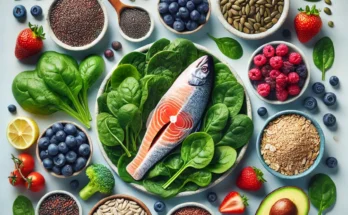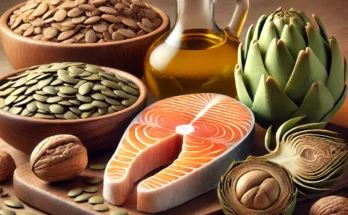Consuming a diverse range of nutrient-rich foods, such as fruits, vegetables, nuts, seeds, and lean proteins, can promote overall health.
Eating a variety of wholesome foods, including fruits, vegetables, nuts, seeds, and lean protein sources, can enhance your overall well-being.
Here are 50 nutritious and tasty foods to add to your diet.

1–6: Fresh Fruits and Berries
Fruits and berries are widely loved for their health benefits.
Naturally sweet and packed with nutrients, they’re also incredibly convenient to add to your diet, needing minimal preparation.
1. Apples
Apples are rich in fiber, vitamin C, and powerful antioxidants.
They’re also highly satisfying, making them an excellent snack to curb hunger between meals.
2. Avocados
Unlike most fruits, avocados are rich in healthy fats.
They’re creamy, delicious, and packed with fiber, potassium, and vitamin C. Try using avocado as a nutritious alternative to mayonnaise in salads or spread it on toast for a wholesome breakfast.
3. Bananas
Bananas are rich in potassium and provide a good dose of vitamin B6 and fiber.
They’re also incredibly convenient and easy to take on the go.
4. Blueberries
Blueberries are not only delicious but also packed with antioxidants.
5. Oranges
Oranges are famous for their vitamin C content, but they’re also a great source of fiber and antioxidants.
6. Strawberries
Strawberries are packed with nutrients while being low in carbs and calories.
They’re a great source of vitamin C, fiber, and manganese, making them a tasty and healthy dessert option.
Eggs are incredibly nutritious, offering a rich source of protein, vitamins, and minerals.
Lean, unprocessed meats can be a valuable addition to a healthy diet, providing essential protein and nutrients without excess fat.
8. Lean beef
Lean beef is a great source of protein when eaten in moderation. It also offers highly absorbable iron, making it a beneficial addition to your diet.
9. Chicken breasts
Chicken breast is low in both fat and calories, yet high in protein. It’s also an excellent source of various essential nutrients.
10. Lamb and mutton
Sheep are typically grass-fed, and their meat is often higher in omega-3 fatty acids compared to omega-6, making it a healthy option for those seeking a balance of fats.
While nuts and seeds are high in unsaturated fats and calories, they can help reduce the risk of cardiovascular disease, cancer, and other health problems. They’re a satisfying snack that may aid in weight management.
These nutrient-dense foods require little to no preparation, making them easy to include in your daily routine. They can also add texture and flavor to salads and other dishes.
However, it’s important to note that they’re not suitable for those with nut allergies.
11. Almonds
Almonds are a popular nut packed with vitamin E, antioxidants, magnesium, and fiber. A 2021 review found that almonds may aid in weight loss, support gut health, enhance cognitive function, help manage heart rate during stress, and even prevent skin aging.
12. Chia seeds
Chia seeds are a highly nutritious addition to your diet. Just one ounce (28 grams) provides 11 grams of fiber, along with significant amounts of magnesium, manganese, calcium, and other essential nutrients.
13. Coconuts
Coconuts are a good source of fiber and contain medium-chain triglycerides (MCTs), a type of healthy fatty acid that may offer various health benefits.
14. Macadamia nuts
Macadamia nuts are delicious and stand out for being higher in monounsaturated fats and lower in omega-6 fatty acids compared to many other nuts.
15. Walnuts
Walnuts are packed with nutrients, including fiber, vitamins, and minerals. They pair wonderfully with feta cheese, making a delicious addition to salads.
16. Brazil nuts
Brazil nuts are nutrient-dense with a smooth, buttery texture. They support thyroid function and are an excellent source of selenium, a vital mineral for overall health.
Calorie for calorie, vegetables are some of the most nutrient-dense foods you can eat. Including a variety of them in your diet helps ensure you get a broad spectrum of essential nutrients.
17. Asparagus
Asparagus is a low-carb, low-calorie vegetable that’s rich in vitamin K, making it a healthy choice for your diet.
18. Bell Peppers
Bell peppers, available in colors like red, yellow, and green, are crunchy, sweet, and packed with antioxidants and vitamin C.
19. Broccoli
Broccoli is a cruciferous vegetable that can be enjoyed both raw and cooked. It’s an excellent source of fiber, vitamins C and K, and contains more protein than many other vegetables.
20. Carrots
Carrots are a sweet, crunchy root vegetable rich in fiber, vitamin K, and carotene antioxidants, which offer numerous health benefits. Toss some carrot sticks in your lunch box or pair them with guacamole and other dips.
21. Cauliflower
Cauliflower is a versatile cruciferous vegetable that can be added to curries, roasted with olive oil, or used raw in salads or for dipping.
22. Cucumber
Cucumbers make a refreshing snack. They’re low in both carbs and calories, mostly water, and contain small amounts of vitamin K and other essential nutrients.
23. Garlic
Garlic is a flavorful and nutritious addition to salads and savory dishes. It contains allicin, known for its antioxidant and antimicrobial properties, and may help reduce the risk of cancer and cardiovascular disease.
24. Kale
Kale is rich in fiber, vitamins C and K, and other beneficial nutrients. It adds a satisfying crunch to salads or can be stir-fried. You can also bake it in the oven to make crispy kale chips.
25. Onions
Onions have a strong, distinctive flavor and are a staple in many recipes. They contain bioactive compounds that may provide health benefits.
26. Tomatoes
Though technically a fruit, tomatoes are commonly considered a vegetable. They’re flavorful and provide nutrients such as potassium and vitamin C. For a bit of fun, try growing tomatoes right on your windowsill!
More Healthy Vegetables
Other vegetables worth mentioning include artichokes, Brussels sprouts, cabbage, celery, eggplant, leeks, lettuce, mushrooms, radishes, squash, Swiss chard, collard greens, turnips, and zucchini.
27–32: Fish and Seafood
Fish and other seafood are not only delicious but also offer important nutrients like omega-3 fatty acids and iodine, which can support heart and brain health.
27. Salmon
Salmon is an oily fish packed with nutrients, including protein, omega-3 fatty acids, and some vitamin D.
28. Sardines
Sardines are small, oily fish that are incredibly nutritious, providing calcium, vitamin D, and a host of other beneficial nutrients.
29. Shellfish
Shellfish like clams, mollusks, and oysters are nutrient-dense and make a tasty, light meal. Ensure they come from a trusted source to avoid toxins.
30. Shrimp
Shrimp are low in fat and calories but high in protein. They also provide selenium and vitamin B12.
31. Trout
Trout is a freshwater fish similar to salmon, offering great taste and nutritional benefits.
32. Tuna
Tuna is low in fat and calories, high in protein, and a great option for anyone looking to boost protein intake while keeping calories in check. Be sure to choose low-mercury varieties.
33–35: Grains
Whole grains are vital for your diet as they provide healthy carbs, micronutrients, fiber, and energy.
33. Brown Rice
Brown rice is more nutritious than white rice, offering fiber, vitamin B1, and magnesium.
34. Oats
Oats are rich in powerful fibers like beta-glucans, which help lower cholesterol and support gut health.
35. Quinoa
Quinoa is high in nutrients like fiber and magnesium, and is an excellent source of plant-based protein.
36–37: Breads
Whole grain breads are high in fiber and nutrients, making them a better option than refined white bread.
36. Ezekiel Bread
Ezekiel bread is made from organic sprouted whole grains and legumes, providing a nutritious alternative.
37. Homemade Low-Carb and Gluten-Free Breads
Consider making your own low-carb or gluten-free bread, so you control the ingredients.
38–41: Legumes
Legumes are a great plant-based source of protein, iron, and fiber. Proper preparation reduces digestive issues.
38. Green Beans
Green beans, also known as string beans, are perfect in side dishes or as a crunchy addition to salads.
39. Kidney Beans
Kidney beans are rich in fiber and nutrients but must be properly cooked to avoid toxicity when raw.
40. Lentils
Lentils are high in fiber and a good source of plant-based protein, making them a healthy addition to many meals.
41. Peanuts
Peanuts are technically legumes, not nuts. They are high in nutrients and antioxidants, with research suggesting they can aid in weight loss and blood pressure management.
42–44: Dairy
Dairy products are a good source of nutrients, but they may not be suitable for everyone.
42. Cheese
Cheese is nutrient-dense and can replace meat as a protein source. Choose less processed varieties for a healthier option.
43. Dairy Milk
Dairy milk is rich in vitamins, minerals, protein, and calcium. Studies suggest that dairy consumption can lower the risk of cardiovascular disease, though full-fat versions may have drawbacks.
44. Yogurt
Yogurt is made from fermented milk and contains probiotics, providing digestive benefits alongside its other nutrients.
45–46: Fats and Oils
Unsaturated fats and oils are key components of a healthy diet.
45. Extra-Virgin Olive Oil
This heart-healthy oil is rich in monounsaturated fats and antioxidants that offer powerful health benefits.
46. Coconut Oil
While coconut oil is high in saturated fat, it contains MCTs, which may offer health benefits similar to olive oil. Use in moderation due to its impact on LDL (bad) cholesterol.
47–48: Tubers
Tubers, or root vegetables, are full of nutrients and serve as a great food source.
47. Potatoes
Potatoes are rich in potassium, vitamin C, and fiber, especially when eaten with their skins. They may also help with weight loss due to their water content.
48. Sweet Potatoes
Sweet potatoes are loaded with antioxidants like beta carotene, vitamin A, and other essential nutrients. They’re delicious when baked, mashed, or added to various dishes.
49. Apple Cider Vinegar
Apple cider vinegar may help regulate blood sugar levels when consumed with meals. It’s perfect as a salad dressing or to add flavor to dishes.
50. Dark Chocolate
Dark chocolate, rich in flavonoids, can help manage cholesterol and reduce heart disease risk. However, moderation is key, as the health benefits are most effective in small amounts. The American Heart Association recommends enjoying it for pleasure rather than solely for health benefits.


